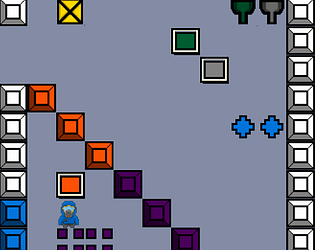Leading Approaches to Master Multiplayer Puzzle Games for Free and Beat Your Buddies
Leading Approaches to Master Multiplayer Puzzle Games for Free and Beat Your Buddies
Blog Article
Unlock Your Mind's Possible With Testing Challenge Gamings
Testing problem video games offer an intriguing chance for boosting cognitive feature and psychological acuity. These brain-teasers, ranging from logic-based problems to elaborate jigsaw challenges, not just give amusement but likewise promote essential reasoning and hone problem-solving abilities. The true effect of these video games on cognitive growth might expand far beyond simple amusement.
Advantages of Problem Gamings
Participating in puzzle games uses a plethora of cognitive advantages that expand past mere home entertainment. These games promote different cognitive processes, improving mental acuity and analytical skills. Routine involvement in puzzle-solving activities can improve memory by motivating the brain to develop links and keep information. This is achieved through pattern acknowledgment and the psychological manipulation of shapes and concepts, which are crucial elements of many challenges.
Additionally, challenge video games boost focus and attention to information. As players submerse themselves in fixing complicated issues, they develop the capacity to focus for extensive periods, an ability that is transferable to real-world circumstances. Furthermore, puzzles usually need a tactical strategy, cultivating important reasoning and the ability to examine situations from numerous point of views.

Kinds of Challenging Puzzles
Puzzle video games been available in a varied variety of types, each offering one-of-a-kind obstacles that accommodate different cognitive abilities. These puzzles vary from the traditional to the modern-day, appealing players in different ways. Among the most prominent kinds is the logic challenge, such as Sudoku, which requires deductive thinking and pattern recognition. These problems test the player to fill in missing out on elements based upon offered constraints, cultivating important reasoning.
One more group is the jigsaw puzzle, which faucets right into spatial awareness and visual understanding. By assembling with each other little sectors to form a complete photo, gamers boost their capacity to imagine and revolve things mentally. Crossword puzzles, on the other hand, are language-based, difficult people to remember vocabulary and synonyms, thus exercising verbal abilities and memory.
Furthermore, there are mechanical problems, like the Rubik's Cube, which require critical planning and hand-eye coordination. These puzzles require a series of transfer to get to the desired outcome, urging players to think numerous actions ahead. Additionally, digital problems, such as escape room games, incorporate numerous components of logic, spatial reasoning, and synergy in a virtual environment, using a comprehensive difficulty that promotes numerous cognitive faculties at the same time.
Improving Cognitive Abilities
The advantages of puzzle video games expand past home entertainment, acting as useful devices for enhancing cognitive skills. Involving regularly in these psychologically stimulating activities can considerably sharpen different psychological professors, such as analytical, memory, and focus to information. Challenge games need players to believe critically and strategically, promoting a setting where abstract reasoning is required. This duplicated exercise of psychological agility boosts neural connections, promoting cognitive flexibility and flexibility.
Moreover, puzzle games play a critical role in improving memory retention. In addition, puzzles often necessitate continual interest and focus, which can boost concentration skills over time.
Moreover, the analytic aspect of problems encourages imaginative thinking, as gamers learn to approach difficulties from various angles. This skill is particularly indispensable in dynamic workplace, where innovative services are often required. Generally, problem video games contribute in cultivating a sharper, more nimble mind.
Picking the Right Video Game
Selecting the right problem game is vital for taking full advantage of cognitive advantages. Picking a game customized to your passions and cognitive goals can considerably enhance your mental acuity. Various problem games target various cognitive skills, such as problem-solving, memory, spatial thinking, or logical thinking. Recognizing the details cognitive abilities you want to create is the first step in picking a proper game.

Furthermore, considering your individual rate of interests can sustain inspiration and involvement, which are vital for long-term cognitive advancement. read review A game that aligns with your leisure activities or interests will likely hold your passion much longer, making sure constant cognitive workout. Inevitably, picking a video game that aligns with both cognitive goals and individual interests will generate the most useful results, fostering a appealing and efficient psychological exercise.
Tips for Making The Most Of Advantages
Uniformity is key; regular interaction with problem video games can lead to sustained cognitive advantages. Diversifying the kinds of problems you play-- such as crosswords, Sudoku, or logic puzzles-- promotes different cognitive skills and protects against mental torpidity.
In addition, progressively increase the difficulty level of the puzzles. Beginning with simpler puzzles and considerably taking on even more challenging ones can boost analytical skills and cognitive resilience. It is likewise beneficial to take part in reflective practice; after finishing a problem, take a moment to evaluate the strategies you employed and think about different strategies. This reflection can strengthen your understanding and improve future performance.

Final Thought
Including tough puzzle video games into day-to-day regimens uses significant cognitive advantages, boosting mental acuity and analytical abilities. By engaging consistently with a range of challenges, such as logic crosswords, games, and jigsaws, individuals can boost memory retention and crucial reasoning skills.
Testing challenge games present an appealing possibility for boosting cognitive function and mental acuity.Challenge video games come in a diverse range of types, each offering special challenges that cater to various cognitive abilities.The advantages of problem games extend beyond enjoyment, offering as useful devices for improving cognitive skills. click to investigate Various challenge video games target various cognitive skills, such as analytical, memory, spatial thinking, or rational reasoning. Expanding the types of problems you play-- such as crosswords, Sudoku, or reasoning puzzles-- promotes different cognitive skills and avoids psychological stagnancy.
Report this page